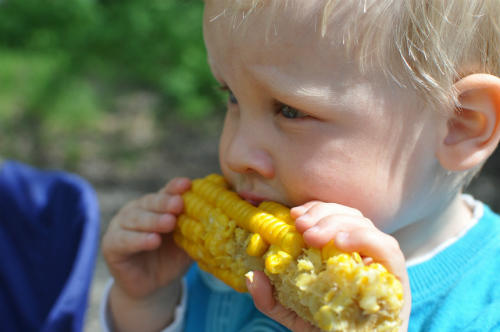
A no-fuss nutrition guide for fussy eaters
Getting our little ones to understand the ins and outs of a healthy diet is a little trickier than teaching them their ABCs. But getting the fundamentals right is a great start!
Children require a balanced and nutritious diet to sustain their growing bodies, and to help them get a head start on feeling good and getting the most out of their food and life.
Follow this simple nutrition guide to help your children understand healthy foods that the whole family can enjoy.
There are six broad nutrition categories: The macro-nutrients: carbohydrates, proteins, lipids (fats and oils) and water The micro-nutrients: vitamins and minerals Children’s dietary requirements vary from our own; ideally, you want your child to be eating (per day):
- Colourful vegetables: 5 serves
- Root vegetables and unrefined grains (if tolerated): 4-5 serves
- Meat, poultry, fish, eggs and beans: 2 1/2 serves
- Fruit: 2 serves
- Dairy (if well tolerated): 1-2 serves
Go wild on veg and mild on fruit
Vegetables loaded with minerals, vitamins and fibre are crucial to a child’s diet. However, this major food group can often be met with resistance. It is important to get your child into a routine of including vegetables in their diet daily. Incorporating vegetables into baking is a clever way to disguise them. Vegetables such as beetroot, carrot and zucchini can be easily blended and baked into healthy muffins or cakes. Fruit is also vital for your child as it offers essential vitamins and minerals and is a far better choice than lollies. Keep in mind, however, that fruit can have a high sugar content and should be eaten in moderation and with variation.
Getting your child to understand where the food we eat comes from is a great way to help them create a healthy relationship with food. Building a vegetable garden – or even an herb garden – is a good way to get the whole family involved, and everyone will benefit from the fresh produce.
If you’re gonna go with grains, go whole!
Carbohydrates are encouraged for little ones who require energy to keep them going all day long. Unrefined grains and root vegetables contain more fibre, vitamins, minerals and antioxidants than their processed and refined counterparts, such as white bread, where the outside, nutrient-rich layers have been stripped during processing. These wholefood choices are also lower in the glycemic Index, meaning your child is going to release the energy from their food much more slowly. Food with a high GI spikes blood sugar levels and will lead to energy swings.
Trying to get your child to understand that foods with earthy colours are beautiful can be tricky. Packing your child’s lunch box with carrot sticks or wholegrain bread is a good start but may be met with a battle, so it’s crucial that you accompany it with tasty low sugar ingredients such as a minimally processed peanut butter!
Fats are good
We are often misconceived about fats and believe that anything with fat in it is bad. However, good fats not only exist, but are in fact essential for a balanced diet. Certain special fats contain docosahexaenoic acid (DHA), which is an omega-3 essential fatty acid that is required for optimal health but cannot be produced by the body. DHA, therefore, must be obtained through diet or supplements. Getting your child to eat fish – a good source of DHA – may create some confrontation, so implementing a children’s flavoured DHA supplement into their diet may be the way to go.
Dairy for strong bones
Calcium is considered an important ingredient of a healthy diet in order to help children develop strong, healthy bones and teeth. Depending on their age, most children would benefit from drinking between 1 to 4 glasses of milk each day, especially if they are not receiving any other form of high-calcium foods. Most dairy products are excellent sources of calcium and, even better, are loaded with sources of protein if your child doesn’t like to eat meat. If milk becomes a problem, try incorporating alternatives into their diet, such as nuts, seeds and even greens if you can find a fun way to deliver them. Offering smoothies loaded with fruit and their favourite yogurt is a good option, and soy products with added calcium can sometimes do the trick.
Protein building blocks
The body needs protein in order to build healthy muscle and tissue. Sources of protein include eggs, poultry, lean meats, legumes, fish, nuts and cheese. Choose low-fat meat and poultry or seafood options at least twice a week. Beans and peas are also a great option when it comes to increasing the protein in their nutrition. You can also opt to add nuts to their favourite yogurt, cereals or vegetables, or try buying a nut butter spread.
In the past, discretionary food items such as chips, lollies, biscuits, chocolate, etc. have often been allowed as ‘extras’ within the guidelines put out by various groups that publish dietary recommendations. However, these are starting to become eliminated as the effort to encourage healthy eating and emphasise ‘real’ foods of nutritional value catches up with the challenging task at hand for mothers everywhere: Giving your children the very best start and habits to live by in life.


Warren Maginn is a Clinical Nutritionist, College Lecturer and Public Educator with both undergraduate and postgraduate qualifications in clinical human nutrition. Warren has a passion for helping all individuals to gain greater personal understanding of themselves and their needs to achieve greater personal health potential.
Nordic Naturals Children’s DHA
Nordic Naturals is committed to delivering the world’s safest, most effective omega oils
Since 1995, Nordic Naturals have been committed to bringing forward a new definition of fish oil as it relates to purity, freshness, taste, and dosage. Nordic Naturals continues to shape industry standards as they pursue their mission of making the highest-quality products on the planet and correcting the global omega-3 deficiency. What this primary focus on omega-3s means to you is safer, more effective, and better-tasting fish oil.
All Nordic Naturals’ products are sustainably sourced and third-party verified for purity. Certificates of analysis for every product are available upon request.
Visit researchnutrition.com.au to find a stockist near you.








